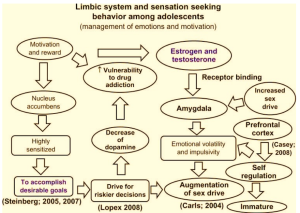






Name
Chamberlain University
PSYC-290 Lifespan Development
Prof. Name
Date
During adolescence, particularly when puberty begins, teens tend to exhibit more emotional responses and impulsive behaviors. This is largely due to the rapid development of the limbic system, which controls emotions and drives, while the prefrontal cortex, responsible for judgment and decision-making, develops more slowly (Santrock, 2019). The limbic system’s heightened activity paired with the slower maturation of the prefrontal cortex can make teens more prone to acting on impulse and less capable of making sound decisions. As a result, teens may often appear irrational or overly emotional during this developmental stage.
The prefrontal cortex, which is crucial for judgment and rational thinking, continues to mature into early adulthood. This delay in development can lead to challenges in regulating emotions and behaviors, particularly during the teenage years (Santrock, 2019). Parents and guardians often find themselves navigating these emotional shifts as teens struggle with self-regulation, judgment, and decision-making.

Helping teens navigate their emotional and behavioral challenges involves guiding them through this developmental period. One effective strategy is behavioral control, where parents or caregivers actively listen, engage in discussions, and offer guidance. This approach provides teens with a framework to better understand and manage their emotions and actions (Arain et al., 2013). Moreover, it is important to closely monitor the teen’s social environment, including their friends, social media activities, and group behavior, as peer influence plays a significant role in their development.
By encouraging teens to practice decision-making and guiding them in developing better judgment, parents can help facilitate the maturation of the prefrontal cortex. Allowing teens some freedom to make decisions within limits can help them learn from their mistakes and grow into more responsible individuals. Overprotection may hinder their ability to learn crucial life skills, such as independence and problem-solving.
Self-regulation is another critical aspect of adolescent development. During adolescence, the brain’s capacity for self-regulation is still maturing, making teens more prone to taking risks (Arain et al., 2013). Parents can play a vital role by helping their teens make more logical choices, guiding them away from potentially harmful situations. This involves fostering a supportive relationship, where teens feel comfortable seeking guidance and advice when faced with difficult decisions.
Effective parenting during this stage is not about holding a teen’s hand through every challenge but rather teaching them how to make thoughtful decisions on their own. Parents should act as a safety net, providing support and guidance while allowing their teens the space to grow and develop into independent individuals.
Arain, M., Haque, M., Johal, L., Mathur, P., Nel, W., Rais, A., … Sharma, S. (2013). Maturation of the adolescent brain. Neuropsychiatric Disease and Treatment, 9, 449–461. https://doi.org/10.2147/NDT.S39776
Santrock, J. W. (2019). Life-span Development (17th ed.). Retrieved from https://online.vitalsource.com/#/books/9781260166323/cfi/6/